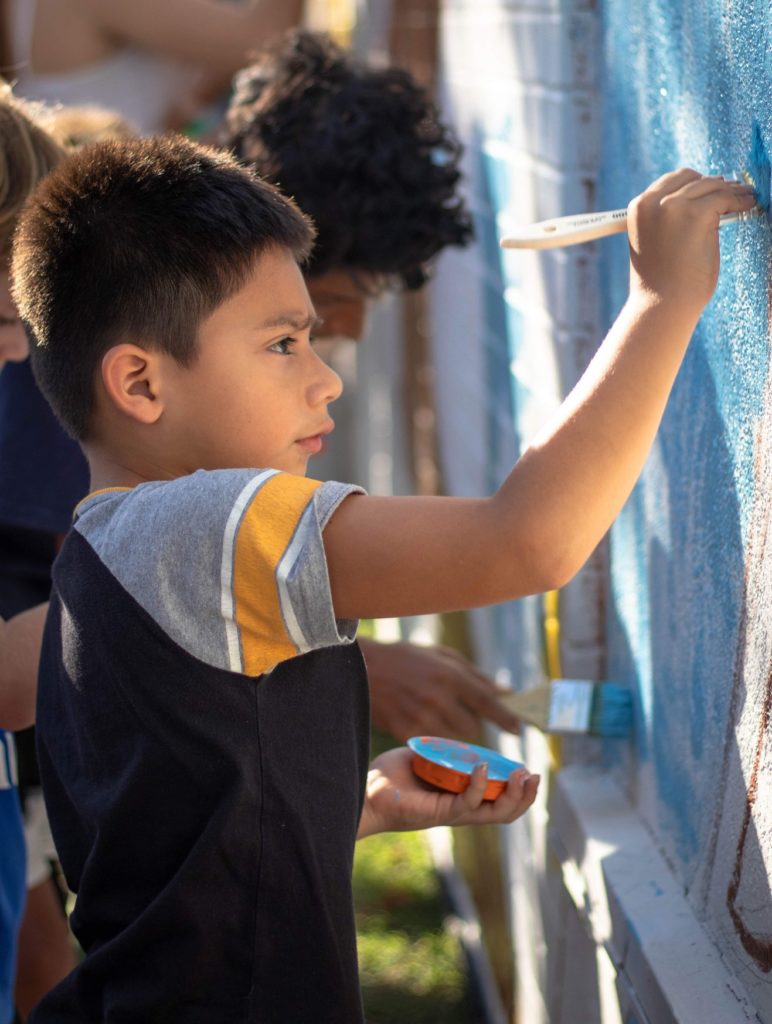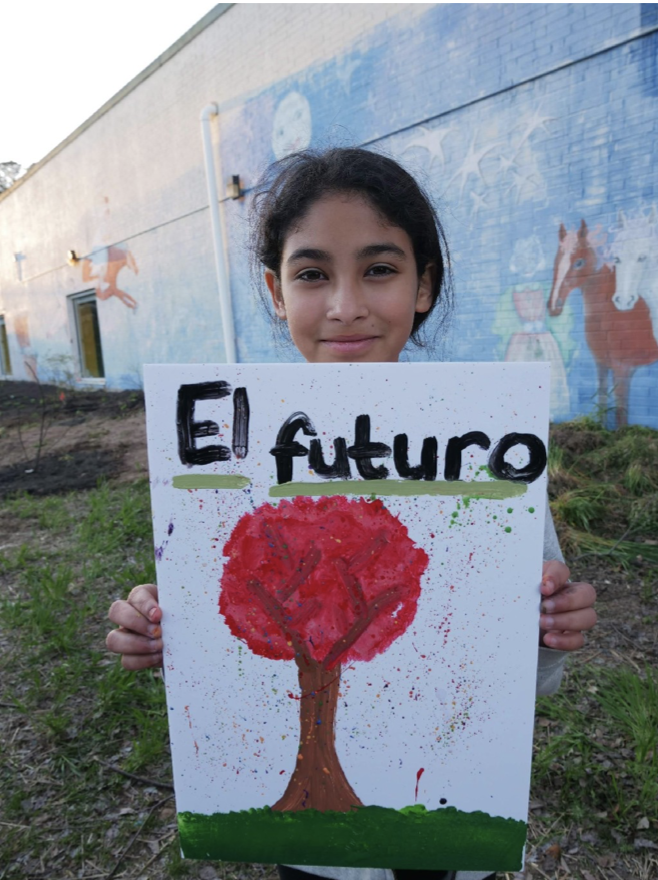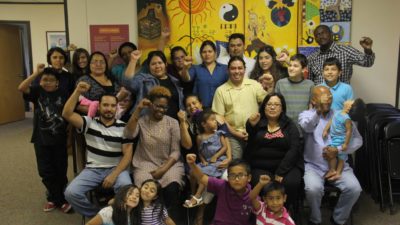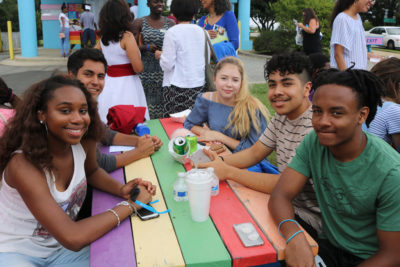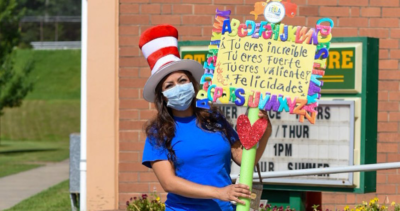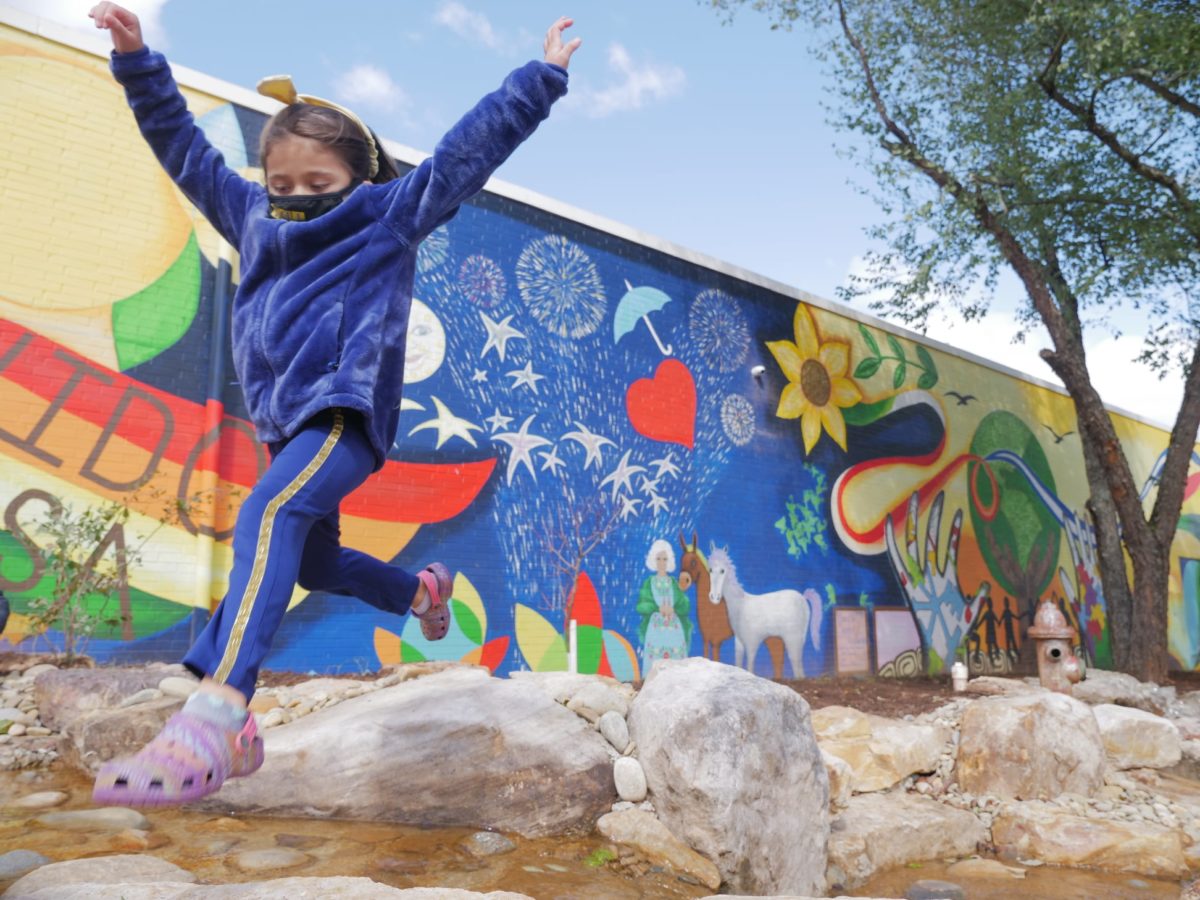

This year, Durham-based MDC chose nine organizations to join a program called “Learning for Equity: A Network of Solutions” — or LENS-NC. The program aims to improve outcomes for students at the intersection of race, income, and learning differences. This article on El Futuro’s mental health services is part of a series introducing our readers to these nine organizations.
Luke Smith could be sitting in a nice office someplace charging a couple hundred dollars an hour as a child psychiatrist. That’s not who he is, though. He’s more of the roll-up-your-sleeves and get-involved type.
Smith is the director of El Futuro, a nonprofit clinic in Durham where Spanish-speaking immigrants can access culturally responsive mental health services. He’s been working with the immigrant community for 20 years, and you can hear some of his “why” when he talks about early experiences.
Like the time the Department of Social Services brought a student into his clinic after suspected child abuse. The DSS representative said the child had told his friends at school his parents were molesting him.
“But the word for ‘to bother’ in Spanish is molestar,” Smith said. “His parents were bothering him. They weren’t abusing him at all.”
Or another experience, when Smith attended an Individualized Education Plan (IEP) meeting on behalf of a Latino family. He remembers the red carpet treatment he received as a doctor, and the very different treatment offered to his patient-family.
There was an element of classism, and it wasn’t limited to the English speakers in the room.
“The translator — yeah, they got the job because they speak Spanish, but they’re not really connected with this family,” Smith said. “He was looking down at this family.”
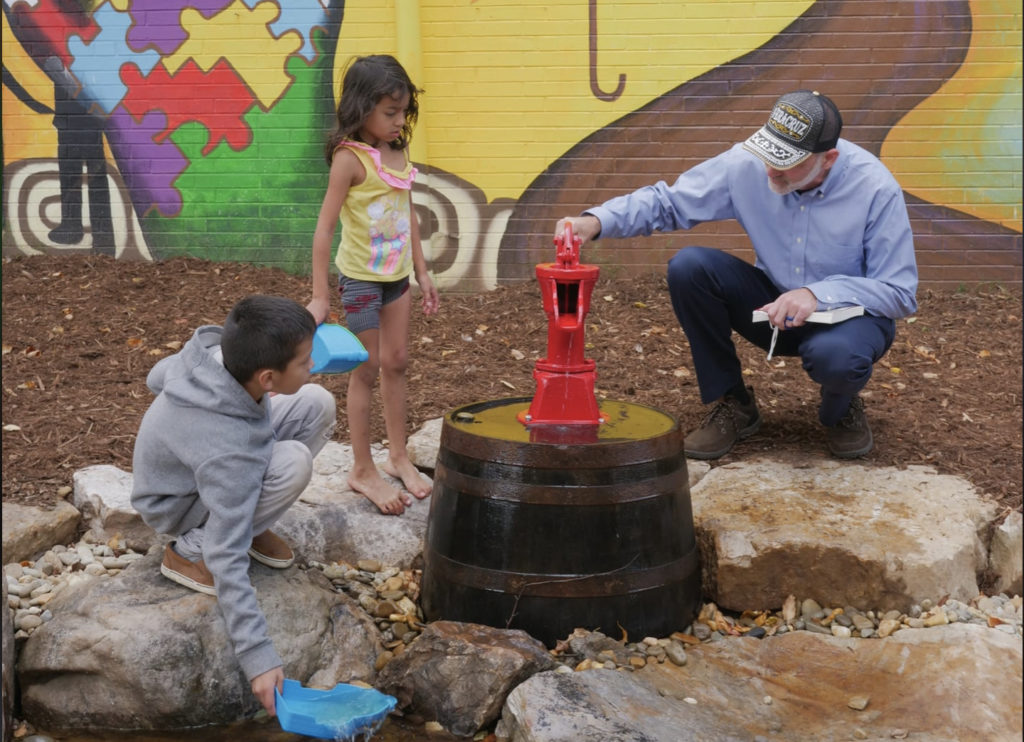

These early experiences helped Smith see the barriers between Spanish-speaking families and the schools. He realized that the challenges to offering mental health services were not just language-based, but were cultural, too.
“It’s not clear-cut; it’s a little more messy than that,” he said. “And not everybody is willing to get messy.”
But Smith rolled up his sleeves and helped create a place where members of the Latino community — adults and youths — feel comfortable going for mental health services.
El Futuro, which was founded as a volunteer organization in 2001, formed as a nonprofit in 2004 and now has a staff of 43 — including 25 clinicians.
Today, it serves the mental health needs of Latino families in Durham and Siler City — “in a bilingual environment of healing and hope.” And it does so with nearly 75% of funding coming from grants and donations.
Here’s how it works.
Confianza — developing deep trust first, then meeting mental health needs
The first ingredient is trust. But not just any trust — confianza.
“It’s a deep trust,” Smith said. “When an immigrant comes into our community, it’s what they’re looking for and hold onto very quickly. So many of us have that experience of going to another country and finding somebody you can talk to, and you feel like, oh, this is my best friend all of a sudden. I don’t think we always reciprocate that very well as Americans when people come to the U.S. But when we do, we make friends for life.”
Smith talked about a stigma in the Latino community regarding mental health. Based on his work, he said, he realizes that setting up a clinic and offering mental health services is not enough to guarantee El Futuro can serve the community.
Instead of hanging a sign and hoping Spanish-speaking residents will come to it, El Futuro tries to meet the community where they are.
People come for services, but what they find is relationship. And through building relationships, El Futuro has grown more effective.
“We’ve never once had to really advertise our services because people, through those key concepts of confianza and relationships, people found us. We’ve never once had to go out looking for people.”
Calor humano — a focus on compassion
As the organization has grown, it has maintained its personality and focus on calor humano — human warmth.
El Futuro serves nearly 1,800 people a year, about 45% of whom are youths. Most of El Futuro’s clients have experienced trauma related to poverty and migration.
Nearly all, about 98% live below the poverty level and 56% have been victims of crime.
“Making mental health treatments accessible for underserved Latino families,” Smith says, “improves their quality of life and helps people get back to their dreams for the future that brought them to our community in the first place. It creates a better, healthier community for all.”
The mental health services are a priority, but when families come they aren’t just getting prescriptions or therapies. They’re building connection.
Recently, for instance, El Futuro transformed the green space adjacent to its building into a garden. Families visit with mental health needs, but they hang out in the garden and start to build community.
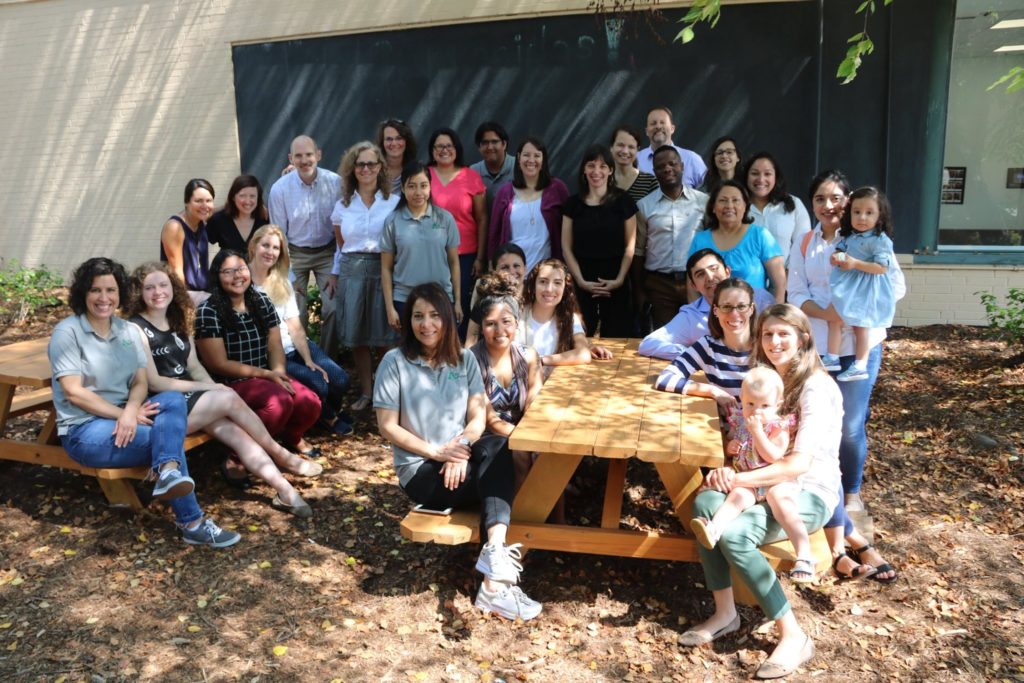

“It’s about bringing in people from very different backgrounds, people from different socioeconomic standings, races and ethnicities, and just kind of watching the melting pot happen out there in a nice way,” Smith said.
“When kids come to play, their parents start to talk, and I always say that one of the greatest factors that affects the immigrant community is the lack of social capital and the relationships they leave behind [in their country of birth] and the big networks that they leave behind.
“And so being able to see those reconnect here in new ways is really … it’s a fun experience. In one way, we have a community garden, but then the other garden is of people growing and little seeds being planted.”
La Mesita — sitting around the little table
El Futuro’s authenticity is a key driver of its effectiveness, Smith said. This is a byproduct of not only providing services, but providing them authentically and with love.
People have noticed the success. For several years, El Futuro has received calls from other counties in the state asking for help.
But deep trust and human warmth cannot be manufactured out of cookie-cutter molds. El Futuro did not think it could understand each of these communities and build the kinds of relationships it needed to be most effective.
“We realized that every place where we could go has its own microclimate almost, in terms of the community, who’s in the community, who are their leaders, where is the infrastructure, where is the funding coming from,” Smith said. “It’s really hard to figure that out in each community.”
Instead, El Futuro looked for organizations and people already serving the Latino populations in those communities. It invites them to sit together with El Futuro, as if around a little table — la mesita.
“We use the concept of cultural humility,” Smith said. “We know that we haven’t learned everything. Really, what we’ve been doing is we are just gathered around the table discussing what’s new and how to do a better job. So we thought, what we could do is bring in more people to the table, pull up more chairs. ‘Pull up a chair to the table and learn with us,’ is what we say.”
El Futuro has been doing this through its La Mesita Latino Mental Health and Substance Use Provider Network since 2018. Over the last year, Smith says, this network has grown by 60% to 866 people.
The training network includes webinars, conferences, and weekly case studies.
“It’s a way that we can leverage what we’re doing,” Smith said. “It’s just a very dynamic learning platform that we’re trying to push out, and seeing all the people flock to it is really great.”
Global mental health work done locally — by el Puebla
Smith said he was always drawn to international work, from his time as a psychiatry resident at UNC in the early 2000s. His plan from the start was to go overseas and work with populations in another country.
He discovered something when he started volunteering at a community health center while still a resident.
“That’s when I found out that the other country had come to us,” he said. “It was a little bit disappointing.”
Not for a reason you might think. Smith isn’t trying to build a wall or anything. His 20 years on the front lines of this work have proven quite the opposite, in fact.
He’s tearing down walls and building bridges — and gardens.
Smith’s initial disappointment stemmed from the unexpected revision of his dreams. He thought he’d travel the world — a doctor missionary on a global quest. Then he realized he didn’t need to go quite so far to serve his purpose.
“I fell in love with the culture, the language, the cross-cultural challenge,” Smith said. “And I wanted to work on the real disparity gap that I saw — the disproportionate under-care for people who were Spanish speaking or Latino descent.”
That love has bled into the very fabric of El Futuro, which prides itself on its empathy and love for the community it serves. Indeed, more than the ability to speak Spanish, these are the traits Smith looks for when El Futuro makes new hires.
“I sometimes use the term el pueblo when we’re hiring somebody,” Smith said.
A pueblo is a town or village, but el pueblo can refer to someone who is of the community.
“You can hire somebody who’s not, strictly speaking, from the community, but is very much like that — of the community,” Smith said.
He holds that as the greatest compliment. It’s what he wants to be, and what El Futuro strives to be. Muy pueblo.


